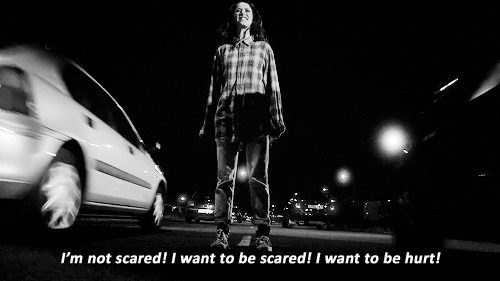Having finished 'Grey Sister', I've been approaching that terrifying ultimatum: submission.
This, of course, means letting other people read and, inevitably, criticise my work. It's a necessary evil on the path to publication, but the first step is always the hardest and the fear of rejection will inevitably rear its head. What if the feedback is bad? What if no one likes it? What if this isn't for me after all?!
It's advisable to get feedback before launching head-first at the professionals. Giving your writing to friends and family is a great way to test the water. They'll undoubtedly give you the encouragement you need to hear and tell you what works. Of course, such lovely and supportive darlings as your nearest and dearest will probably avoid the harder truths for the sake of saving your feelings. I still think asking people you know to have a read-through is a good thing (if nothing else, it gives you a more gentle introduction to the criticism monster!). But, once you've had your pat on the back and well deserved high-fives, it's time to give yourself a bigger test.
In the past fortnight, I submitted my synopsis (aimed to attract a prospective agent) to an online forum. It was, to be honest, ripped apart. Don't get me wrong, I'm sure my critic was aiming to be helpful and I understand that my synopsis was a not-all-together-well-researched first attempt. But it was pretty hard to hear and had me scampering for the safety of my blanket and a strong glass of merlot.

I've also been to a writers critique group run by
my local (and lovely) writers group, who kindly allowed me to join them. Having sent in my piece (an extract from Chapter 1), all the submissions were sent out to the attending group so we could have a look through and get some ideas ready. It felt good to be able to give as well as receive feedback and gave a great feeling of support to the meeting. The group assured me beforehand that they would be gentle, but it honestly felt like such a welcoming and supportive group that I can't imagine they would ever be harsh or careless in their feedback. They were all very positive, giving everyone encouragement, as well as ideas for improvements. What criticism they did give was well thought out and always outnumbered by the positive reflections on the piece.
It's made me realise that there are some things to remember in giving good feedback.
Be sensitive.
When someone lets you see their work - whether it's writing, or art, or an essay for school - you need to remember that this is something a person has worked hard on and is, most likely something they're nervous to have criticised. Focus on the positives and point out the things you think work well first. Even if it's something obvious, it's good to let them know they did well.
Don't be unnecessarily harsh.
If there's a problem or a repeated error, don't make a joke of it or rip it apart. Again, be sensitive. No one wants to hear that they've messed up, especially if the mistakes are given more importance than the successes.
Be honest.
If something doesn't work, say so. While there's no reason to be unkind, the author hasn't asked for your advice just to have their head patted. So long as it's constructive, criticism is invaluable. A writer needs to get an outside perspective to see issues they might not be able to see. Don't let your fear of offending the author stop you from offering your opinion.
Suggest improvements.
When you see a problem, try to imagine how it could be improved. If there's a grammatical error, say what will fix it. If there's a problem with continuity, point out what's missing. Empty criticism doesn't mean much if a writer has no where to take it.
And if you're on the receiving end...
Listen. Take notes. Don't take the criticism as an attack, because it IS there to help. But if you disagree, argue your case. No ones perfect and if you strongly believe your original choices were correct, it's within your rights to say so.
I think my forum days might be over, to be honest. But the careful support and encouragement of the writers group was so useful and really helped my confidence. If you have a considerate audience, there shouldn't be anything to fear in asking for advice.
Just be sure you're prepared to be as kind to others as you want them to be to you.










